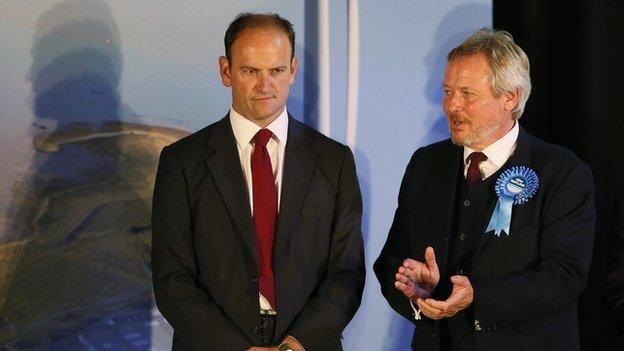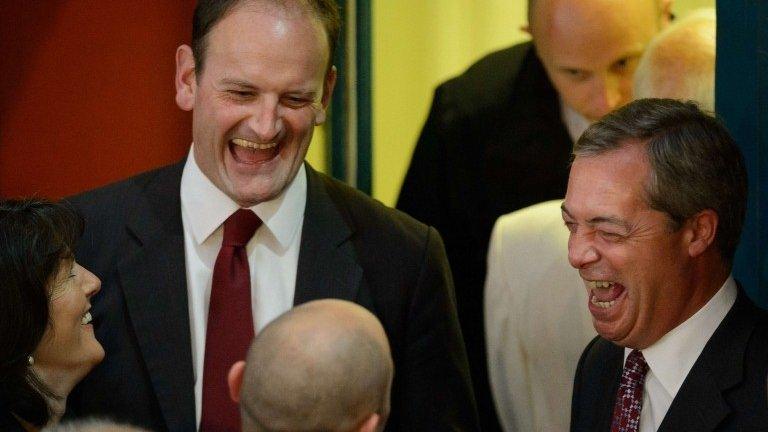Ed Miliband: Labour not complacent after beating UKIP
- Published
Ed Miliband said the Tories lost in "their own backyard" in the Clacton by-election
Ed Miliband said UKIP could not represent the interests of working people as he reflected on a close by-election victory over Nigel Farage's party in Heywood and Middleton.
Labour just held on to the seat by 11,633 to 11,016 votes.
Mr Miliband said UKIP voters did not think the parties listened to them, or that the country represented them.
And he predicted the next election would be a fight against "disillusionment and despair".
Speaking in Heywood, where he congratulated winning candidate Liz McInnes, Mr Miliband said Labour had changed and realised it was "not prejudiced" to worry about immigration.
But he said he did not think UKIP could "represent the interests of working people" because they wanted to cut taxes for the rich.
Earlier he promised Labour would not have "a shred of complacency" after avoiding a shock defeat.
He said the Conservatives were in retreat in the North West and had lost to UKIP in "their own back yard" of Clacton in the other by-election.
Ms McInnes got 41% of the vote, up slightly on Labour's share at the 2010 election.

John Bickley, for UKIP, came second with 39% of the vote - up from 3% in 2010. The Conservatives got 12% of votes, down from 27% in 2010 and the Lib Dems 5%, down from 23%.
Ms McInnes said she was proud to have been elected, saying "our vote held up, but we had not anticipated the Tory vote collapsing quite so dramatically".
She added: "Our core voters turned out. We didn't take anyone's votes for granted and we have run a very strong positive campaign."
Veteran Labour MP Frank Field said the result in Heywood and Middleton meant that "all bets were off" for Labour at next year's general election.

But Mr Field said: "If last night's vote heralds the start of UKIP's serious assault into Labour's neglected core vote, all bets are off for safer, let alone marginal seats at the next election."
Shadow foreign secretary Douglas Alexander said the surge in support for UKIP underlined "the scale of the challenge to traditional politics".
Labour's Douglas Alexander: "We recognise Labour has work to do"
Mr Alexander said both the Heywood and Middleton and Clacton by-election results showed none of the three main political parties could "deploy the tools of traditional party politics".
He told BBC Radio 4's Today programme, the general election would be a fight against public "disillusionment and alienation" with Westminster politicians.
"There can be no ounce of complacency in the Labour Party or any other traditional party. We've got to earn the trust of every single voter," he added.
Public anger
Mr Alexander pointed out Labour increased its share of the vote in the Heywood and Middleton by-election - from 40% to 41%.
He argued that the swing in support to UKIP was the result of a collapse in support for the Liberal Democrats and Conservatives in the constituency.
He also admitted that immigration had proved an important issue in the by-election.
But Mr Alexander argued that the National Health Service had also proved to be a big issue for voters in the by-election campaign, adding; "We need to expose the fact that UKIP want to... charge people to see the GP and that they've got policies that are more Tory than the Tories."
UKIP MEP Patrick O'Flynn later told the BBC's Daily Politics the party did not have any plans to charge people to see their GP, calling it a "foolish idea".
He claimed growing support for UKIP illustrated public anger at "how politics was being done".
But he said the way to beat UKIP was "conversation by conversation, street by street" and to "acknowledge the alienation that people feel from politics".

Political correspondent, Iain Watson, writes:
Labour won Heywood and Middleton at the last general election with 40% of the vote - on a much lower turnout yesterday, they retained the seat with 41% of the vote.
A small step forward for them but a giant leap for UKIP from a derisory three per cent and fifth place behind the BNP in 2010 to second place and 39 per cent of the vote now - a swing from Labour to Ukip of 18 points.
That would have been their best ever by election performance - but for Clacton
So Nigel Farage will claim he can take Labour votes in the north just as he can take Tory votes in the south.
But that's not to say he is harming both main parties equally.
The Conservative saw their share of the vote fall dramatically here - as did the Lib Dems.
So it's likely that UKIP took votes from David Cameron's party while Labour gained votes from Nick Clegg's.
That meant that Labour retained the seat and saw off the robust UKIP challenge.
That said, it was a much worse result than Labour anticipated.

But John Mann, the Labour MP for Bassetlaw, told the Guardian, external newspaper Labour would not win a majority government unless Mr Miliband broadened the party's coalition to include working class opinion.
In his reaction to the by-elections, David Cameron said they showed that a vote for UKIP could let Labour in. Nigel Farage hit back by saying that the Heywood and Middleton result showed that in the north west a vote for the Conservatives could let Labour in.
Peter Tatchell, who stood as a Labour candidate in the 1983 by-election in the south London constituency of Bermondsey, said Labour bore some of the responsibility for the rise of UKIP.
He said on Twitter: "Labour has part responsibility for rise of UKIP. It played Thatcherism lite & neglected working class people."
The left-wing political blog Left Foot Forward, external also suggested Labour faced an uphill battle to hold its seat in Heywood and Middleton at the general election.
It said of the by-election result: "More depressing perhaps is the fact that 40% of voters have backed UKIP and another 12% the Tories. That's a majority for the right whichever way you look at it."
- Published10 October 2014

- Published10 October 2014
